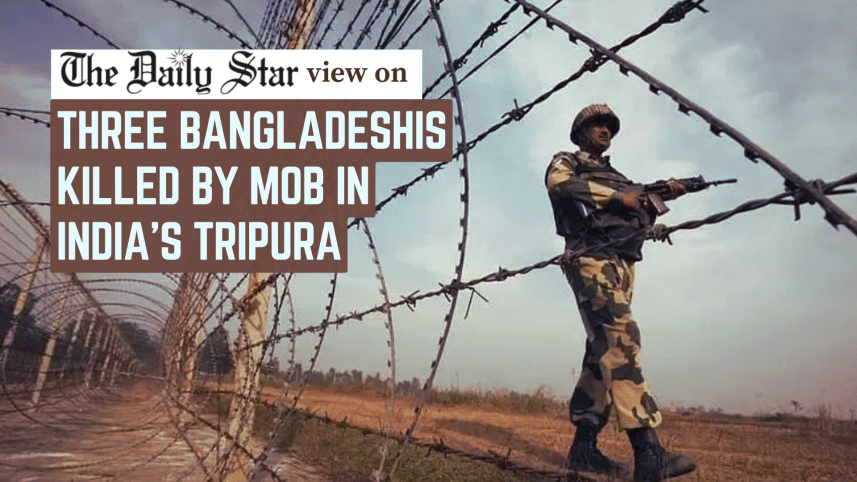Tripura mob killing of Bangladeshis exposes the accountability gap

The gruesome killing of three Bangladeshis by a mob in India's Tripura state last week demands a response that goes beyond mere diplomatic formality. The foreign ministry in Dhaka is right to call for an immediate, impartial, and transparent investigation into this heinous act. Regardless of the alleged circumstances, an accusation of illegal activity can never justify vigilante justice. The sanctity of life and the rule of law must prevail over frontier vengeance.
The 4,096-kilometre-long India-Bangladesh border is among the most porous and complex boundaries in the world. Stretching across riverine landscapes, dense forests, and farmlands, it cuts through communities that have shared socioeconomic ties for generations. Every day, people cross this frontier—some to visit relatives and others to trade goods. Amid this flux, illicit cross-border activities, especially cattle smuggling and narcotics trafficking, have flourished. These operations are not random but sustained by intricate local networks, often involving people on both sides of the divide.
Against this backdrop, the Tripura killings highlight the precarious state of trust between the two nations. It may be recalled that just weeks before the incident, at a director-general-level conference between the Border Guard Bangladesh (BGB) and India's Border Security Force (BSF), both sides had pledged to halt cross-border killings, curb illegal intrusions, and repatriate detained nationals through lawful means rather than force. The conference also outlined broader steps: launching joint awareness programmes, advancing socio-economic development in vulnerable regions, and promoting mutual respect for border integrity. The BSF reaffirmed its commitment to adopting additional precautionary measures, including intensified night patrols in high-risk areas. For its part, the BGB voiced concern over recurring shootings of Bangladeshis by both BSF personnel and Indian civilians. Together, these exchanges aimed to usher in a new phase of restraint and collaboration.
Yet, the killings in Tripura have rendered India's assurances hollow. India's official response—delivered through its external affairs ministry—appeared to prioritise rhetoric over responsibility. By emphasising Bangladesh's duty to "uphold the sanctity of the international boundary" and "support border fencing," New Delhi seemed to shift focus from justice to border management. Infrastructure improvements may be legitimate long-term goals, but invoking them in the immediate aftermath of a tragedy diverts attention from the core issue: accountability.
If India is genuinely committed to maintaining neighbourly goodwill, it must demonstrate that commitment through action. A thorough, independent, and transparent investigation must follow, culminating in the prosecution of all perpetrators. Anything less may further deepen mistrust and corrode the credibility of bilateral mechanisms built over the decades. At the same time, the Bangladesh government must continue to defend the right to life of its citizens, regardless of their socioeconomic status. Even those who engage in illicit border trade deserve the protection of law and the dignity of due process.



 For all latest news, follow The Daily Star's Google News channel.
For all latest news, follow The Daily Star's Google News channel.
Comments